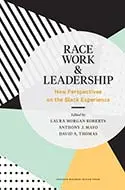
Excerpt by Laura Morgan Roberts, Anthony J. Mayo, and Serenity Lee
Blacks have been integral to the economic foundation of the United States since its inception, yet that foundation was forged on an institutionalized inequality, which continues to have debilitating effects. The social construction of blackness has been an economic tool for centuries; it has been used as a means of sourcing under- or wholly unpaid labor, rationalized by an attribution of blacks’ biological inferiority.
Though research has since amassed ample evidence that contradicts these essentialist notions of the superiority or inferiority of a given race (Gannon, 2016; Goodman, 2003; Kolbert, 2017), the color line persists as an enduring social issue in the United States. Over 150 years post-emancipation, the wealth gap between blacks and Americans of other racial backgrounds continues to widen, with predictions that black families’ median wealth will decrease to $0 by the year 2050, while white families’ median wealth will exceed $100,000.
There are currently no black women Fortune 500 CEOs, and at the sixteen Fortune 500 companies that share detailed demographic data, senior executive and board positions are dominated by white men (approximately 85 percent, a number that has remained consistent for decades).
Since May 2016, the share of Americans who say race relations are getting worse increased from 38 percent to 44 percent.
On the other hand, significant advances have been made with respect to black leaders’ economic influence over the past century. Most remarkably, the former president of the United States, Barack Obama, was placed at the helm of the US economy in the midst of the Great Recession and executed multi-billion-dollar stimulus packages to reinvigorate industries during financial crises. A handful of black entrepreneurs (e.g., Oprah Winfrey and Robert Smith) are among the wealthiest Americans, and though they represent the exception, their influence is nonetheless widespread as their businesses increase in value.
The number of businesses majority-owned by black women grew 67 percent between 2007 and 2012, more growth than women-owned businesses as whole saw (Nielsen Report, 2017). In light of these advances, a recent study by Ernst and Young (2017) found that one-third of Americans surveyed said that the corporate focus on diversity has overlooked white men, and 62 percent of this group believe that white men are being overlooked for promotion and advancement opportunities.
[Read "6 Steps to Building a Better Workplace for Black Employees"]
A December 2017 Pew Research Center report of 1,503 adults found that racial discord has increased in the United States; a majority of respondents say race relations are generally bad, while 38 percent say they are generally good. Since May 2016, the share of Americans who say race relations are getting worse increased from 38 percent to 44 percent.
The Center for the Study of Hate and Extremism at California State University at San Bernardino recently released a report stating that hate crimes have spiked in the United States for the fourth year in a row. African Americans are the most frequent targets of hate crimes overall and racial hate crimes in particular, accounting for 23 percent, while Jewish people are the most targeted religious group.
According to an article in the Washington Post, hate crimes are grossly underreported, and 90 percent of the country’s approximately sixteen thousand law enforcement agencies choose not to supply data or report no hate crimes to FBI statisticians, likely skewing the data (Hauslohner, 2018).
Notably, Ernst and Young (2017) also reported that 74 percent of respondents support an increased focus on diversity and inclusion (D&I) in today’s workplaces, and 72 percent think society’s focus on D&I can help companies build a better working world.
Boosting women and minorities is “good business,” as diversity improves the quality of decision making on complex tasks, team performance, and innovation. Yet, despite the long-standing interconnections between race, work, and leadership—and the (de)valuation of labor that has reinforced social stratification—the explicit discussion of race and organizational leadership is still considered taboo or irrelevant in many business circles.
Recent research has indicated that CEOs (and lower-level managers) who champion diversity are penalized, unless they are white males (Johnson & Hekman, 2016). A few CEOs have initiated firm-wide discussions of race, such as Tim Ryan (PWC), Michael Roth (Interpublic Group), Bernard Tyson (Kaiser Permanente), and Randall Stephenson (AT&T) (see Johnson, 2017, for other examples).
Yet, among young black professionals who aspire to advance to senior leadership positions, the most frequently adopted strategy is to remain silent about race or other issues of inequality or injustice in order to avoid being labeled as an agitator (Cose, 2011).
Nearly 40 percent of black employees surveyed feel it is never acceptable at their companies to speak out about experiences of bias (Hewlett, Marshall, & Bourgeois, 2017). Silence about race in the workplace compromises relationships (Phillips, Dumas, & Rothbard, 2018) and work engagement (Hewlett et al., 2017). It also feeds into a belief that meritocratic principles determine career advancement, and firms who endorse such meritocratic beliefs paradoxically practice more bias in evaluating workers (Castilla & Benard, 2010).
[Read "6 Steps to Building a Better Workplace for Black Employees"]
Reprinted by permission of Harvard Business Review Press. Excerpted from Race, Work, and Leadership: New Perspectives on the Black Experience edited by Laura Morgan Roberts, Anthony J. Mayo, and David A. Thomas. Copyright 2019 Harvard Business School Publishing Corporation. All rights reserved.